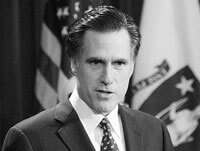Mass. governor invokes obscure miscegenation law to limit gay marriages
Romney invoked an obscure 1913 state law that was designed to prevent biracial couples from states where interracial marriage was prohibited from getting married in Massachusetts. The governor has notified 50 governors and attorneys general about his decision.
Interracial marriage was illegal in 16 states until the Supreme Court declared such miscegenation laws unconstitutional in 1967.
Thomas Reilly, Massachusetts’ Democratic attorney general, also an opponent of same-sex marriage, said weeks ago that marriage licenses for out-of-state same-sex couples would be limited to those residents from the 11 states that do not expressly prohibit it. But Romney said that same-sex marriage will be available to only those out-of-state couples whose governor or attorney general informs him that same-sex couples can marry in that state, according to The New York Times.
New York Attorney General Eliot Spitzer ruled in March that while it is illegal for New York to perform same-sex weddings, the state must recognize the legal marriages of same-sex couples, such as those married in Canada or the Netherlands. Spitzer, a Democrat who supports same-sex marriage, did not return to phone calls seeking comment on Romney’s decision.
Republican Gov. George Pataki this week joked about gay marriage in describing his relationship with Republican Senate Majority Leader Joe Bruno.
“Joe, I don’t mind making love to you,” Pataki said according to the New York Post, “just don’t ask me to marry you.”
Mary Bonauto of Gay and Lesbian Advocates and Defenders, the group that successfully argued before the Massachusetts high court on behalf of gay couples seeking to marry, told The New York Times that her state “has no legal justification for catering to the discriminatory laws of other states.”
Bonauto said that Romney’s ruling might only apply in the 20 states that have declared same-sex marriages to be “void,” but not in other states where such marriages are considered “invalid” or “prohibited.” In New York, no such law has been passed and in fact, the clause in the state’s marriage law defining spouses is gender-neutral.
New marriage applications for Massachusetts town clerks have yet to be issued, though state officials have reportedly changed “bride” and “groom” to “party A” and “party B.” When applying for a license, all couples, both straight and gay, will now need to provide proof of residency, under the Romney regulations. Couples will also be asked if either of the partners is a member of a civil union or domestic partnership.
Some companies in Massachusetts say that once gay couples can marry there, those who only have domestic partnerships or civil unions will be dropped from partner benefit programs unless they marry. Beth Israel Deaconess Hospital, one of the largest employers in the state, was the first to announce the change, saying that as of May 17 gay and straight couples will be on an equal footing.
In a last ditch efforts to stop gay couples from marrying, some Massachusetts legislators have introduced bills to remove the four members of the Supreme Judicial Court who ruled in favor of it. Rep. Paul Lasoco, a Republican, has proposed a bill to accord civil unions to every couple in the state, in effect eliminating marriage, similar to a bill introduced in the New York Assembly by lesbian legislator Deborah Glick, a Manhattan Democrat.
Meanwhile, one former federal judge denounced the upcoming gay marriages in Massachusetts. Robert Bork, who was denied confirmation to the Supreme Court during the Reagan administration, told a Roman Catholic congregation this week in Stamford, Conn. that the same-sex marriage ruling in Massachusetts constituted “judicial sin.”



































